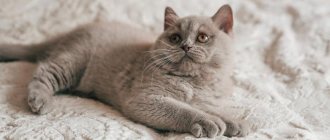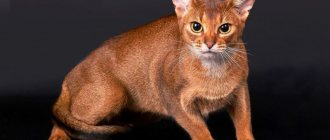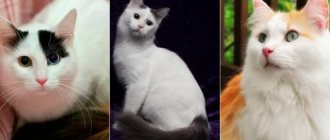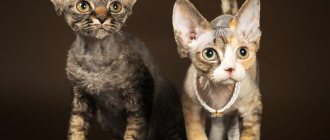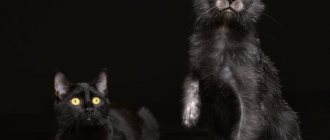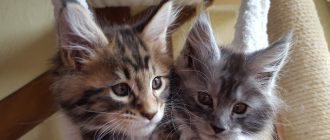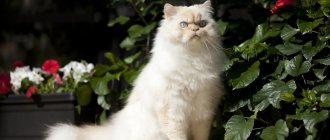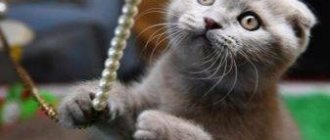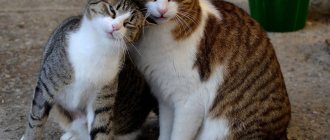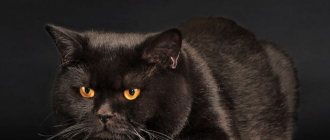Finally, the long-awaited kitten of the British breed is squealing in the house - plump, plush and snouty! Everyone happily carries him in their arms. But only proper care for British kittens can ensure their healthy physical development, good mood and, as a result, a long and happy life.
British breed kittens
A little about the breed
It is believed that British Shorthair cats trace their ancestry back to the famous Cheshire cat. But seriously, this is one of the first officially recognized and standardized breeds: already at the first London cat show in 1871, the British were widely represented.
British cats have dense, plush fur.
British Shorthair cats have a strong build, developed pectoral muscles, a short thick tail, strong dense legs and a round massive head. A captivating feature of their appearance is their thick cheeks and round amber eyes. Another distinctive feature of the breed is its dense, plush coat. More than 60 color variants are recognized, but the main ones are lilac and blue.
British cats have round amber eyes
A little history
According to their appearance, the British are divided into separate breeds: long-haired, short-haired and lop-eared. Which have differences in the history of their origin, in the approval of the standard.
- The British Shorthair breed was first introduced in July 1871 at an exhibition in London. They received universal recognition; visitors were attracted by their beautiful, silky appearance. a coat densely stuffed with wool and soft to the touch. The US felinological community approved the British and spread the breed throughout the world. In Russia, the first shorthaired kittens appeared after the 1980s.
- British Longhairs became a breed variety due to the discovery of a gene for long hair. It was discovered after crossing cats and female cats with the Persian longhair breed. Previously, longhairs were not recognized as a breed; they were classified as a breed.
- The British Fold, with its graceful build, has characteristic hanging ears. A new species was born thanks to Scottish farmers who, when crossing purebred British cats with Scottish breeds, got fold-eared kittens. As a separate breed, it has become known since 1959, but is not recognized by the Felinological Association. The standards have not yet been registered.
Important! When choosing what to name your pet, pay attention to its character. For calm, balanced Britons, stricter, shorter nicknames are suitable. For the Scots, softer-sounding words are suitable.
Basic rules when choosing a name
Choosing a name for a kitten, like a child, is a crucial moment. It is recommended to adhere to certain rules for naming a kitten:
- The names they like, more than one, are first checked for sound, listening to how the word is pronounced and perceived.
- A short name of 2-3 syllables can be pronounced well; it is easy for adults and children to pronounce.
- Nicknames are given once for life; cats do not recognize them and do not react to new sounds.
- Choose a short word, sonorous and at the same time simple with hissing words, the cat will get used to it faster.
- Cats like nicknames with sounds: “s”, “ch”, “sch”, “zh” and “z”.
- You should not give your pets unsound, obscene or unpleasant-sounding words.
Names from English history
Assigning historical names to British cats has been popular both in the past and today. The use of historical names of famous citizens in England has become widespread. Outstanding personalities are perfect for the nicknames of British Shorthair, Longhair, Scottish Fold, and breeds originating from Britain.
| Example for selection | For a cat | For the cat |
| From the mythology of the Celtic islanders | Brigita, Sabrina, Boand, Caer, Danu, Grainne, Badb, | Boand, Kaer, , Boand, Kaer, Dan, Grain, Badb, Ceridwen, Morrigan, |
| Names of wizards from legends | Morgana, Melusina, Pressina | Morgan, Perseus, Arthur, Count |
| From the myths of King Arthur | Ginevra, Guinevere Elaine. | Barnard, Astolat |
Royal names
England is famous for the rich heroic history of its development. The British are proud of the dynasty of kings and queens who have ruled the country for centuries and still today. Giving the names of rulers to purebred British and Scottish cats is a national tradition.
| Example for selection | For a cat | For the cat |
| Kings and Queens | Antoinette, Elizabeth, Maria, Beatrice, Stefanita, Yucca, Nancy. | Arthur, Prince, Monarch, Chelsea, Lear, Baron, Prince, Barnard, George. |
| Royal theme | Bohemia, Valkyrie, Elba | Aristocrat. |
When to adopt a kitten
Only a mother cat can provide proper care for newborn British kittens; this is possible in a nursery where kittens are not separated from their mother until they reach the age of 12 weeks. This approach allows:
- gain the kitten the required body weight - 1.5-1.7 kg by 3 months;
- receive complementary foods in the required amount and with the required regularity;
- receive breast milk as the main diet;
- learn self-care skills from your mother;
- undergo vaccination and anthelmintic treatment.
British kittens should be fed 4 times a day with natural food.
Up to three months, there is a high probability of injury for kittens due to weakness of the skeletal system, and complications after vaccinations are also possible. Therefore, reputable nurseries give away kittens that have reached the age of three months.
If the babies are over 2 months old, caring for British kittens is not difficult, although it requires free time. After all, pets should be fed 4 times a day with natural food, preparing fresh meals daily, including the necessary set of vitamins, proteins, fats, carbohydrates, minerals, and acids. A complete switch to dry food at this age is fraught with complications of the digestive system for the kitten. The kitten's weight should double in a month. At three months of age, the kitten is transferred to two meals a day.
It is advisable to give away British kittens at three months of age.
British kitten: at what age can you adopt
Most people want to adopt a pet at the age of 4-6 weeks, citing the successful experiences of friends. It's nice to play with the baby, watch his growth, the formation of his character. But for the fluffy one, weaning from his mother before 12 weeks is a traumatic factor.
By three months, the young Briton had completed a full course of breastfeeding, which has a positive effect on the immune system, the functioning of the digestive tract, and was separated from his mother by her own mother, without any trauma to the delicate child’s psyche.
The kitten has acquired the skills to use a litter box, can eat on its own, and has passed the first stage of vaccination. He is less dependent on his brothers, sisters, and cat.
He makes contact with strangers more easily and is ready to explore the big world. It will be easier for him to settle into a new home, get used to other people, and learn to communicate with animals (if he has any). The optimal age for introduction into a new family is 10-12 weeks.
Be sure to read:
Kobi cat with beautiful eyes - what kind of breed: truth or fiction, description, character, care
Where is the best place to get a kitten?
Attention! Good care of British kittens is possible only in a nursery.
Cats purchased from random people may not turn out to be purebred or healthy. When purchasing a kitten from a nursery, the owner receives:
- medical record of the animal, which indicates vaccinations and anti-worming treatment;
- metric activated in the club for the opportunity to take part in exhibitions in the future.
British kittens require careful care
The first days of a kitten in the house
The long-awaited kitten has been brought. He is scared, cut off from his mother and familiar smells, and does not orient himself in an unfamiliar space. Usually the owner of the nursery gives detailed instructions on the care and maintenance of a British kitten.
Kittens are usually toilet trained at 2-3 months
To make getting used to your new home quick and painless, it is better to act as follows:
- There is no need to grab the kitten, squeeze it and try to immediately teach it to run after a toy - it will struggle, scratch and will perceive its future owners negatively. Therefore, it is better for new owners, especially children, to simply be in the pet’s field of vision, talking to it affectionately and calling it by name. The kitten must be given time to get used to it without scaring it. Soon he himself will come to the owner.
- If the apartment is large, and bowls of food and water and the toilet are located far from each other, then at first they can be placed nearby, but not next to each other. The kitten can be confined to one room for a couple of days, where everything it needs will be located. Then gradually expand the territory, opening doors to other rooms so that he does not get lost and gradually masters the entire apartment.
- In the first days, the animal must be fed with the same food as it was fed in the nursery. The change of food occurs gradually; for this, a new type of food must be gradually mixed into the usual one.
- Kittens are usually toilet trained at 2-3 months. The baby should be shown where his new toilet is by placing a napkin with the smell of his urine there.
The kitten must be given time to get used to its new home.
Having bought a cat, the owner will have to change his habits, and now:
- do not leave entrance doors open;
- install durable mosquito nets on the windows;
- including the washing machine, check its contents;
- close the toilet lid;
- close cabinets;
- watch where you want to sit.
It is important to be in the field of view of the new pet in the first days
How and what to feed
To avoid the obesity characteristic of this breed, you should follow some rules when feeding and caring for British kittens:
- Feeding with natural food. Having decided to limit your cat's diet to natural products, you must remember that cats cannot be given homemade food!
Boiled fish can be given to kittens once a week.
It is not recommended to give to animals:
- milk after 3 months of age;
- pork;
- raw turkey, chicken, beef;
- raw fish.
Cat food includes frozen and boiled meat, except pork, raw eggs, cottage cheese, sour cream, kefir, boiled vegetables, porridge, to which vegetable oil is added. Boiled fish can be given once a week.
Royal Canine is vet approved
To properly care for a British Fold kitten, feeding should be regular, at the same time. Cat meals must be prepared fresh daily.
Your pet's diet should contain vitamins, proteins, fats, and definitely calcium.
- Included in the proper care and nutrition of a British kitten is ready-made food. There are lines of industrial feeds containing all the substances an animal needs, including those approved by veterinarians:
- Royal Canine;
- Hill's;
- Iams;
- Sheba.
Ready-made food can be dry or canned in the form of pates or pieces in jelly.
Advice! To make it convenient for your pet to eat, you need wide, flat bowls. You can put a fountain bowl for water.
Rating of names and nicknames by color
Pedigree British cats are famous for their wide variation in coat color. The most popular and widespread colors are blue and smoky gray. The British have more valuable, expensive types of wool. In monochromatic ones, according to the standard, the inclusion of another color other than the main one is not allowed. Along with blue British breeds, there are rarer coat colors: black, lilac, chocolate, red, white. The ranking of British cat names directly depends on the color of the coat.
According to online surveys of the British cattery, selected data from user surveys were collected. The table provides selected data on the most popular names of British breed cats with different coat colors. Owners took part in the survey and indicated 4,520 names of cats and 6,007 names of British cats.
Link: SunRay BRI Cattery, located in the Moscow region, (https://www.sunny-cat.ru/nicknames.php?gender=2_koshka)
Nicknames of the British cat breed:
| № | List of British dogs by coat color | Number of nicknames | The most popular nickname is | |
| For cats | For cats | |||
| 1. | Red (gold, red) | 164 | Simba | Alice |
| 2. | Gray | 98 | Alex | Anfisa |
| 3. | Leopard (spotted) | 43 | Felix | Cassandra |
| 4. | Whiskeys (striped) | 41 | Casper | Alice |
| 5. | Lilac | 32 | Marseilles | Musya |
| 6. | Smoky | 32 | Marsik | Haze |
| 7. | Marble | 19 | Casper | Marusya |
| 8. | Black | 19 | Cake | Alice |
| 9. | Cream | 17 | Barsik | Sonya |
| 10. | Chocolate (brown) | 11 | Kuzya | Marquise |
| 11. | White | 8 | Sherlock | Squirrel |
| 12. | Brindle (striped) | 6 | Marquis | Musya |
Gray and smoky
A purebred British kitten with a smoky or gray coat is worthy of a name that reflects its appearance and character. This nickname emphasizes the noble origin of the breed and reflects its good-natured character and intelligence.
Options for naming a gray British cat:
| Example for selection | For cats | For cats |
| According to the color of gray wool | Gracie, Greita, Khavroshechka, Jella, Charlize. | Asher, Ash, Ashton, Gray, Ash, Smoke, Smoke, Smoky, Smough, Wulf, Tom, |
| Blooming smoky wool | Chinchilla, Haze, Melon, Smokey, Sheila, Wolfie, Sarah. | Smoke, Smoke, Dimka, Tenek, Dicky, Gray, Hussar. |
Black color
Many people willingly accept a black British kitten into their family, contrary to prevailing prejudices. The coat is strictly one color, completely dark, like the coal of highly purebred British dogs. Such a pet, with a cute face, will bring happiness and prosperity, good luck, if you choose the right name for it.
Black British kittens:
| Example for selection | For cats | For cats |
| By color | Blackie, Chernushka, Soot, Nochka, Leila. | Knight, Naitik, Black, Hey, Noir, Coal, Coal, Chernysh, |
| The nature | Cinderella, Luck, African. | Surprise, Prizent, Negro, Schwarzenegger. |
Blue color
British blue dogs are the most popular and sought after type of this breed. Silver-gray tints add charm to soft wool. All names are selected to match the shade of blue:
| Example for selection | For cats | For cats |
| Blue flower names | Basilisk, Toffee, Forget-me-not, | Cornflower, Iris, Periwinkle, Hyacinth, Crocus, Prolisok |
| For the aristocratic breed. | Selena, Dove, Beauty. | Sax, Yukon, Bassoon, Terry, Prince, Lord, Gray. |
Marble color
The marbled tabby color covers the British coat with a print in the form of symmetrical stripes and contrasting spots, which have a color distinctive from the main one. Pets are given names based on their color and resemblance to small tigers or leopards:
| Example for selection | For cats | For cats |
| Choice for marble on "M" | Marissa, Miranda, Malena, Mandy, Mila. | Madison, Michael, Merlin, Mark, Macho, Marquis |
White color
White British are a very rare species, difficult for breeders to obtain purity of the breed. According to the standard, the presence of any stains on the coat is not allowed. For the little white miracle, all names are associated with white light, angelic:
| Example for selection | For cats | For cats |
| snow-white fluffy | Blondie, Blanche, Belyana, Aisik, Sugar. Snow White, Snow. | Snow, Snowball, Blanche, White, White, Whitey, Snow, Sugar. |
| denote purity | Rally, Riola, Ressi, Chamomile. | Clean, Tide, Taidy, Taidik, Rain, Rainik, Raini. |
| represents good, bright | Cloud, Aspirin, Bailey Krystle, Fleur, Latte, Lucy Luna, Milky, Paloma | Ray, Light, Angel, Angel, Light, Kindy, Gut, Hell, Holly, Casper. |
Red color
Red kittens look cute, mischievous, a name associated with bright, warm, sunny is well suited for them:
| Example for selection | For cats | For cats |
| By red color | Orange. Lingonberry. Freckle. Kashtanka. Clydie. | Red, Rouge, Altyn, Ryzhik, Fox, Fox, Orange, Mandarin, |
| By sunlight | Goldie. Golden. Zee-zee. Goldilocks. Weasel. Sun. | San, Sunny, Firefly, |
| Associated with fire | Sparkle. | Fakir, Fire, Ogonyok, |
Brown and chocolate
British chocolate-colored kittens are a rare breed; they are also called “cinnamon.” The lightened shade “fawn” is considered more valuable by breeders. Names for British dogs with this coat color are chosen based on color. Courageous, heroic nicknames are suitable for them.
| Example for selection | For cats | For cats |
| Brown-chocolate color | Chocolate, Candy, Havana, Toffee, Brownie, Mulatto | Choco, Snickers, Mars, Raisin, Bob, Brown, Zagarik |
| By heroic name | Athena, Dana, Daphne, Maria, Antoinette | Caesar, Richard Zeus, Artibal, Perseus, Aotur, Hanibal. |
Lilac color
It is difficult to imagine what the color of lilac British kittens looks like. Breeding a pink kitten with a blue one sometimes gives this unusual color, reminiscent of a “latte”. Tender, affectionate nicknames, female names of famous or famous ladies, are suitable for kittens. Cats are called beautiful, extraordinary names.
| Example for selection | For cats | For cats |
| By lilac color | Lilia, Lesi, Leya, Li-Li | Liot, Leo |
| By famous name | Diana, Laura, Laima, Aura, Athena, Margot, Mary, Mariam, | Argo, Blue, Ball, Benjamin, Jack, Volt, Guinness, Grog, Dalai, X |
Brindle and striped
When they buy a brindle-striped British cat, everyone mistakes him for a miniature tiger cub. A striped pet with non-intersecting narrow lines, which after reaching a year can turn into leopard spots. Rings and curls will begin to be clearly visible on the sides. For names, the association with striped coloring is used.
| Example for selection | For a cat | For cats |
| By brindle and striped color | Vest, T-shirt, Stripe, Zebra, Snake | Matraskin, Mattress, Telnyashkin, Telnyash, Matrosych Poloskin. |
| By animal names | Rysulya, Lynx, Maryska, Marysya, Maryusya, Maryukha, Maska | Tigridze, Tigrich, Snake, Watermelon, Tigra, Marquis, Bucks. |
Golden color
The British with golden coloring can be confused with the valuable animal chinchilla due to their fur. Due to the rare color of the skin, such kittens are very highly valued. The hairs on 1/8 of their length have shaded pigmentation, giving the cat's fur a beauty that is conveyed in nicknames.
| Example for selection | For a cat | For the cat |
| By golden color | Zolotinka, Zlata, Ryzhulya, Sunny, Svetik, Goldie. | Ogonyok, Zloty, Altyn, Firefly, Golden, Orange |
| According to the pattern on the wool | Tigger, Striped, Sailor | Tiger, Sailor, |
Visit to the veterinarian
When purchasing a pet, you should carefully read the reviews of visitors to nearby veterinary clinics and choose the right one.
The first vaccination for a kitten is given at 12 weeks.
If British breed kittens are cared for correctly, visits to the veterinarian will not be frequent, but kittens should be seen regularly for examinations and vaccinations during the first year of life.
- Vaccination schedule.
Until a kitten that feeds on its mother's milk is 12 weeks old, there is no point in getting vaccinations, because... With milk he receives antibodies that enhance immunity.
When the kitten is one year old, he is vaccinated against rabies.
At 12 weeks, the baby receives the first comprehensive vaccination, which includes components against rhinotracheitis, calcivirosis, and panleukopenia. The vaccine is fixed exactly after 21 days with a similar composition. When the kitten is one year old, he is given the same vaccination for the third time, and a rabies vaccination is added to it.
Important! It is not recommended to get vaccinated while changing teeth, i.e. at 4-8 months.
Caring for British kittens includes preventive removal of worms.
In the future, the pet is given a comprehensive vaccination and vaccination against rabies every year. Even if the cat is constantly in the apartment, annual vaccination should not be neglected.
- Deworming.
Caring for British kittens includes preventive deworming.
Deworming is mandatory before vaccinations. The procedure must be carried out 10 days before vaccination; the drug can be in the form of a tablet or suspension.
If lice, fleas, scabies mites or lice mites are found on a kitten, it is necessary to treat it with drugs against ectoparasites
Until the kitten is six months old, deworming is carried out monthly.
Once the pet reaches one year of age, worming is carried out once a year.
- Treatment against ectoparasites.
If lice, fleas, scabies mites or lice mites are found on a kitten, it is necessary to treat it with drugs against ectoparasites. The products are available in the form of sprays, powders, drops on the withers - the veterinarian will select the most effective one, because For kittens under 3 months of age, only short-acting medications can be used.
For kittens younger than 3 months, only short-acting medications can be used.
What do the British call their cats?
Choosing a name for a British breed does not have different criteria; it is enough to take into account the individual character traits of the pet and the standard characteristics of the breed. The name comes to mind just by looking at the baby, his behavior and habits.
The British, in search of suitable nicknames, decide what to name a British cat so that the pet becomes a family mascot. So that the kitten's name turns into a symbol of prosperity and happiness. The British, in recent years, have been calling their feline brothers unusual nicknames and are looking for cool names.
| Example for selection | For a cat (female) | For a cat (male) |
| to attract money | Currency, Coin, | Dollar, cent, |
| To fulfill a wish | Fairy, Sorceress, Luck, Fortune | Genie, Aladin, Hottabych, Surprise. |
| For Calm and Peace | Peace, Harmony, Rada | Lucky, Lucky, Lucky, Lucky, |
Names for a boy
When a baby is adopted into a family, all members are faced with the difficult task of what name to name the boy’s British kitten. Everyone offers their own version, but first it’s useful to familiarize yourself with all the known names for cats. You can choose by the letter of the alphabet that matches the color of the kitten, you can name it by the name of your favorite cartoon character or legendary personality. But everyone in the family and the kitten itself should like the nickname.
Names for boy kittens:
| Example for selection | For a British cat |
| Depending on the time of year of birth | June, May, Jen, Augustine, Snowball, Breeze, Snowdrop |
| By character traits | Boxer, Big Man, Good Man, Paw, Igrun, Silent Man, Naughty Man |
| By appearance | Bear, Styopka, Fluffy, Kolobok. |
| Traditional English name | Arthur, Bruno, Benjamin, Harold, Gregory, Horace, Henry, John. |
| From the mythology of different nations | Anubis, Balthazar, Mephistopheles, Vulcan, Mars, Perseus, Amurchik, Zeus. |
| Cartoon characters | Tom, Aladin, Sharkhan, Mowgli, |
| Heroic names | Baron, Prince, Bagration, Caesar, Napoleon, Tsar, Babylon, Morgan, |
Names for girls
Cute, beautiful British cats, with a calm, balanced character, independent. They are clean and take care of themselves in the morning. How to name a British cat; choosing a name for a girl is not difficult.
Options for naming a kitten a girl:
| Example for selection | Cats |
| Affectionate in nature | Weasel, Slick, Nice, Cutie |
| To attract love | Lyuba, Lyubava, Beauty |
| Graceful, regal | Margot, Princess, Isabella |
| Independent, willful | Fifa, Zhanna, Queen. |
| By coat color | Rose, Snezhana, Squirrel, Fox, Redhead, Coal. |
| According to taste preferences | Toffee, Caramel, Peach |
| Cartoon or literary characters | Nyusha, Assol, Margot |
| Names of famous women writers | Jane, Joan, Agatha, Virginia, Beatrice, Jacquely. |
| Names of famous actresses | Audrey, Kira, Emma, Tilda, Vivienne, Helena, Kate. |
| Names of popular singers | Adele, Lily, Amy Wine, Melanie, Jesse. |
| Names of beautiful models | Cheryl, Jordan, Karu, Kate, Rosie. |
What does a cat need to be happy?
For British Fold kittens, whose care and nutrition depend on their owners, you need to purchase a number of necessary items:
- Toilet. Open litter boxes for kittens have low sides so that your little pet can easily climb inside. Subsequently, you can purchase a closed tray or one with high sides so that the filler is less scattered around the house.
- Toys. A kitten definitely needs toys! The assortment is varied: balls, mice, laser pointers, etc. And the most important thing is to play with him more often!
- Scratching post. Cats always sharpen their claws - you need to teach your baby to do it in the right place. To do this, you need to sit the kitten near the scratching post and run its paws along the post several times. Kittens quickly understand what is wanted from them.
Drawings of scratching posts with beds and climbing frames for making yourself
Beauty and purity
Caring for British kittens involves mandatory hygiene procedures:
- Combing. Caring for British kittens includes weekly brushing in winter and as needed in summer. You need a metal comb for the undercoat and a small brush for the coat. Cats are scratched according to fur growth and in the opposite direction. Animals quickly get used to the procedure and enjoy it.
- Bathing. It is believed that the British need bathing only after anti-parasitic treatment or if the pet is very dirty. You can use dry shampoo. However, some cats love water and are not afraid to play in it.
- Cat manicure. Mandatory procedure every 2 weeks, starting from 3 months of age. You need special guillotine scissors. When trimming a claw, you should not touch the blood vessels - they are clearly visible in the light.
- Examination of ears and eyes. Particular care for British kittens includes a weekly examination of the ears: they should be free of dirt, odor, and pus. The ears should be cleaned with liquids prescribed by the veterinarian. Also, babies under 5 months often have watery eyes. This goes away with the development of the respiratory system, but you can clean the eyes with damp cotton pads.
Your kitten should have its nails trimmed every two weeks.
Raising a cat
If you don't want your pet to steal food from your table, tear off all your furniture and wallpaper, and shit anywhere, train him. You need to set a task for yourself:
- Do not train your cat to ask for food from the table or eat from human dishes.
- Do not allow the owner to scratch or bite.
Don’t forget to inspect your kitten’s ears every day.
When prohibiting anything (sharpening claws on furniture, hanging on curtains or wallpaper, going to the toilet in the wrong places, gnawing indoor flowers, etc.), you can use a few tips from experienced British owners:
- do not shout or hit the animal - the cat is offended and harbors a grudge, and subsequently he can take revenge;
- you can unexpectedly spray water from a spray bottle on a mischievous cat;
- loudly and suddenly clap your hands when the cat intends to commit an act prohibited by the owner;
- Spray the area where the cat is sharpening its claws or going to the toilet with an air freshener with a bright citrus scent.
Caring for and raising British kittens is not difficult, as they are well trained. As a result of the educational process, the cat must understand the word “no”. It must be said while looking into the animal’s eyes - then the pet understands who is in charge in the house.
Caring for and raising British kittens is simple
Annual kitten care calendar
| Deadlines | event title |
| Once a year |
|
| Twice a year |
|
| 1 time every 2 weeks |
|
| 1 time per week |
|
| Twice a day |
|
How to care for a British kitten
Acclimatization takes about 2-3 days. At this time, the attitude towards the new resident should be even, friendly, and not intrusive. Let him look around calmly. Places for toileting and feeding are determined immediately, shown to the kitten and not changed. Potentially hazardous areas should be fenced off.
If the baby crawls under the sofa, you don’t need to force him out behind the closet; after a while he will crawl out on his own. Children are given preliminary instructions, explaining that the animal cannot be constantly disturbed or disturbed while eating or sleeping. Forbid him from dragging him by the tail, squeezing him incessantly, or hurting him.
Once settled, the Briton will not require any special care. It is enough to keep the tray dry, clean, bowls full (dry food) or feed hourly (natural food), change the water daily, and comb the coat. This breed is quite independent, but the growing pet provokes the owners to play, comes to lie next to them, and caresses them.
What and how to properly comb British kittens?
The plush coat is a distinctive feature of the breed. You will have to teach your baby to comb from the first days. It is better to purchase several accessories to keep the fur in decent shape: a rubber mitten, a comb for the undercoat (used as needed), a comb that imitates a cat's tongue.
It massages the skin well and removes fallen hairs. British cats are combed against the grain and in the direction of hair growth. You cannot use a slicker brush; it will ruin the undercoat.
During the active molting season, cats are given special means to free their stomachs from lumps of licked fur - bezoars. It is worth bathing your pet in case of severe contamination, no more than 1-2 times a year.
The use of human, including baby shampoos and soaps is strictly prohibited. It is necessary to buy a special product for short-haired breeds, taking into account the color, and rinse thoroughly after soaping. Treatment with flea and tick medications is periodically necessary, especially for individuals walking on the street.
Be sure to read:
Character of British cats: main traits, behavior, bad habits, pros and cons of the breed
How to raise a British kitten
The British respond to affection. You can't force someone to follow the rules. You cannot hit a kitten with your hand or with a newspaper, it will be afraid of people and run away. The popular method of sticking your muzzle into a puddle or a pile can cause fear, and the situation will repeat itself due to the negative reaction of the animal.
Moreover, you should not throw a slipper at a kitten, this is akin to throwing a chair at a guilty child. The size and weight of a slipper multiplied by the acceleration of the flight can cause serious injury: concussion, fracture, severe bruise. Feeling love, the pet will strive to adapt to the owner’s requirements, wanting to receive praise and a treat.

